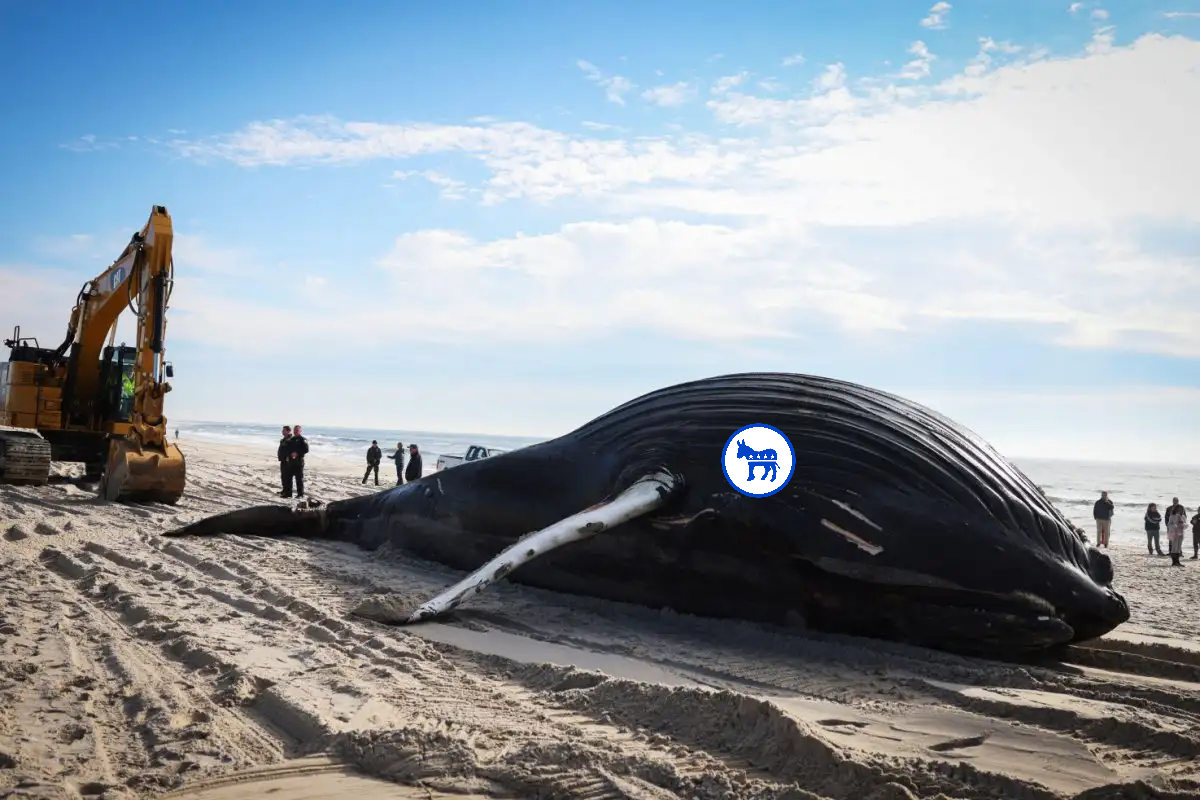Temporary pause...
Dear subscribers, Several of you have kindly asked why I'm not posting at the moment, and the reason
News and commentary for understanding and coping with the years ahead...

But the big stakes here are not immigration law but the rule of law itself. At the same time the Alien Enemies Act was playing out, the Trump administration apparently deported a professor at Brown University’s medical school in direct contravention of a federal court blocking her expulsion (more below). It’s hard not to see the two cases as related and further evidence that we have arrived – two months to the day after Trump’s second inaugural – at the falling-over-the-cliff’s-edge moment we’ve long thought would mark an irreversible-in-the-short-term descent into authoritarianism.
That cliff is right in front of us. There's not nearly the level of alarm among our major institutions – sadly including Big Journalism – that we need right now.


The Democratic Party as it has been is dead, I think, trying to protect an old America that has been killed. It was a suicide, in the end, in the manner of a whale beaching itself; perhaps tired of the swim, or perhaps accessing some mysterious collective ancestral whale memory from millennia past when the tectonic plates were different than they are now, and mistakenly seeking the depths that were in a place where now there is shore. In any case, there it is, on the sand, and the new America will either be what fascists and billionaires and other scavengers want it to be, which is a corpse they can eat right down to the bones. Or: It might become something new and better, if we are willing to fight for something better. I think something better will actually prove more popular than we're going to eat you down to the bones, and even if it isn't we should probably give it a try.
The Senate Democratic leadership's collapse in the face of the one opportunity to challenge the Trump/Republican destruction is disheartening. This commentary likens the Democratic party to a beached whale, a metaphor that is both on-point and depressing.
I hope the author will, as he suggests at the end, offer some workable ideas on how Democrats and others can fight back. We know what "something better" would look like if we had it, but we need more specifics on how to get there.
Kudos: A.R. Moxon


People who are directly affected and who are fighting to protect themselves—as well as core ideas about America—can make for powerful movements.... Yes, retired white middle class suburban women as well as Black women will still also be a vital piece of the movement as they have been since 2017--they are going to show up regardless because so much of the Trump-Musk-Vought-broligarch agenda is anti-women. But this time the movement looks like it could be much broader and led from the center out rather than from the left in. This, I think, bodes a bit better for our chances of protecting democracy and improves our chances of protecting the most marginal groups who the Trump regime has been targeting first in part because they appear easiest to pick off—trans people, immigrants, student activists with unpopular opinions, etc. It's much harder to marginalize a civic movement led by park rangers and VA hospital workers and mail deliverers.
There are so many things to worry about as the Trump-Musk machine rampages through our government and society at large that it can be difficult to find any reason for optimism. Which makes this thoughtful commentary (alternative link here if you can't abide clicking through to Substack), from one of our best political analysts and activists, a rare bit of good news. It's a useful counterpoint to the first item I posted.
It's not as if the author has good things to say about the Democratic "leadership" – a word that increasingly deserves to live in scare quotes given the sheer weakness and incompetence we're seeing from the supposed opposition party. But he observes that the party's grassroots activists have had enough. They are acting on their beliefs despite the leadership's obvious disdain. And, this is key, many of these activists are emerging from the center.
The piece highlights work that deserves to be more broadly known. I find it notable, though unsurprising, that I hadn't heard about the activities he mentions from our traditional "mainstream media" operations. But expecting them to start doing their jobs at this point is, let's face it, futile.
Kudos: Micah Sifry


In trying to sidestep the controversy, Disney has sent a clear message: when faced with right-wing outrage, the path of least resistance is to retreat rather than stand firm. But history has shown that caving to these pressures rarely quells the outrage machine—it often only emboldens it. In the Trump era, where every cultural moment is a front in the sprawling information wars, companies like Disney face an impossible task if they try to remain neutral.
The abject capitulation of Big Media to the Trump regime, noted in this piece about Disney's suck-up decisions, will be remembered by historians as probably the clearest example of cowardice that a supposedly powerful sector of our society demonstrated in these evil times. The Constitution's guarantee of freedom of expression has meant nothing to the media bosses, because they've concluded that a regime that hates media has other ways to punish dissent.
The parade of cowardice from entertainment and news media alike – Disney is both – is shameful, if understandable. When business interests completely overwhelm honor and civic values, we get decisions like the ones we're seeing at Disney and the Washington Post and so many more organizations.
But as Disney et al will find out soon enough, when bullies see weakness they beat up on weaklings all the harder. The Disney is a massive corporation, and it has the power to fight back. What a shame that its leaders are too afraid to even try. Someday the shareholders will realize – quite possibly too late – that courage would have been better for business.
Kudos: Jon Passantino


Trump can threaten funding cuts. He can promise punishment. But he can't change the reality: Once enough people mobilize, the dynamic fundamentally shifts. As Chenoweth's research shows, nonviolent protests are twice as likely to succeed as violent campaigns. Why? Because they're more accessible – they don't exclude people who fear bloodshed, they don't require physical strength, and they're easier to discuss openly. This accessibility is what allows movements to reach that critical 3.5% threshold. We're at that crucial moment where individual actions begin compounding. You don't need permission to stand up. Your action IS the permission others are waiting for.
I don't fully buy into the logic in this commentary, and the author acknowledges that 3.5% of the population is not a hard and fast number, but the research cited is fairly persuasive. The key point is that we need to get off our phones and into real-world action.
Kudos: Gil Duran
This newsletter is a compendium of the reporting and commentary that best explains the America's political, economic, and social conditions – and, most important, how we can find a way back from the dark days ahead. You will rarely find anything here from the New York Times or Washington Post or any of the other Big Journalism companies that failed us so completely during the 2024 elections and are now sucking up – even more than usual – to Donald Trump, his cult, and corporate oligarchs. My focus will be on smaller, more honorable outlets (and individuals). I hope you'll support them with your attention and your money. For more details, please read my About page.
I spend a lot of time looking for essential coverage, and hope you'll help me by letting me know about the good stuff you find. Let me know.
Was this forwarded to you? If you would like to have your own free subscription, please click here.